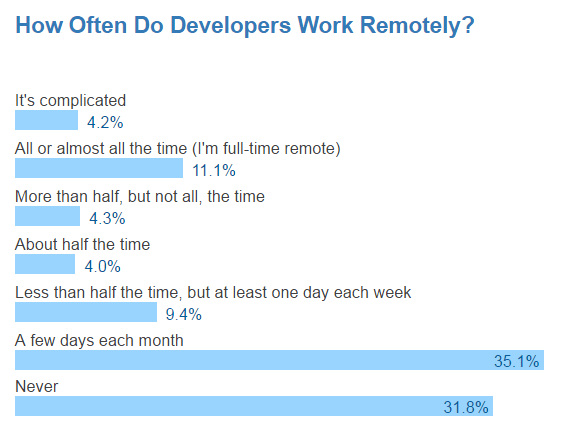Work from home is one of the main bonuses that programmers require.

Working from home several days a week is a long-time privilege of select programmers. But if 20 years ago, this option was more the exception to the rule, now developers are demanding it from the employer. She is valued as highly as the availability of vacations and time off, extended medical insurance and adherence to normal work schedule without overtime. This is indicated by the results of numerous studies , including the results of a survey of developers at Stack Overflow Developer Survey Results 2017 .
In the end, now there are so many tools for organizing remote work: Slack, Skype, Google Hangouts, Basecamp, BlueJeans. Group frequent, video conferencing, collaboration and project management. Why would a programmer even go to the office every day?
Stack Overflow has been conducting such studies annually since 2011, and the Developer Survey Results 2017 report contains the results of a survey conducted in January of this year. A record number of respondents took part in it: more than 64 thousand people, about three-quarters of them called themselves web developers, 61.9% know JavaScript.
')
In general, there are many interesting things. For example, the myth that all developers learn programming from childhood is dispelled. In fact, 11.3% got a job within a year after they learned how to program, and 36.9% got jobs from one to four years. On the other hand, the overwhelming majority of developers program other than work as a hobby and / or participate in open source projects (81%).
Another interesting attitude to the change of work. So, only 13.1% of developers are actively looking for a new job, but at the same time 75.2% are ready to listen to an interesting proposal. Wise approach. By the way, the survey also showed the developers in which programming languages earn the most. The most popular JavaScript, by the way, is at the end of the list.
Among other things, the survey on Stack Overflow found, finally, how to pronounce GIF.

But the results of the answer to the question that programmers value most in employment. 53.3% answered that this is the possibility of remote work. This option was the second in demand after vacations / time off. It is even more important than extended medical insurance (probably extended insurance is meant by “health benefits” if standard insurance is included in the basic package) and is much more important than the annual bonus or stock options.

Currently, every 68.2% of developers work remotely at least a few days a week, and 11.1% work in this mode almost constantly.

It's nice that in the ranking of countries where programmers most often work remotely full-time, Russia is in first place in the world.

Remote work is best suited for specialties related to graphics (design, programming), and worst of all - to developers of desktop applications and embedded systems.

The American Community Survey (IPUMS) statistics show slightly different numbers, but also confirms the popularity of remote work among programmers. According to their data, at the beginning of 2015, about 8% of all programmers in the United States worked remotely. This is less than the Stack Overflow numbers (12.8%), but still significantly more than in any other profession, and much higher than the average for all professions of 3%.

According to statistics from American Time Use Survey, the percentage of programmers working remotely increased dramatically in 2012-2015.
It seems that more and more employers understand the benefits of such a regime, especially for the programmer. With discipline, working from home is almost always more efficient than office turmoil, even without considering the enormous amount of time it takes to get to the office. Surveys showed that employees work remotely more productively and feel happier . It is strange that many large corporations like Facebook, Google, IBM do not understand this and do not encourage work from home , and in addition build new giant offices with open layouts.
Over the past decade, the number of programmers working remotely has been growing at an average of 11.5% per year. But this advantage does not apply to all evenly. Surveys show that more experienced developers with higher salaries are more likely to get the privilege of working from home. And they are among those who value it most.
According to some experts, the gradual disappearance of highly paid professionals from offices and their transition to work in a remote mode can have broad social and political consequences . For example, this may affect the redistribution of financial flows, which were previously concentrated in the centers of large cities.
Source: https://habr.com/ru/post/326476/
All Articles